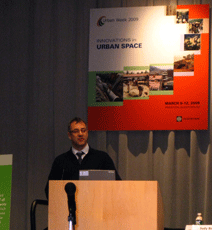
The 2009 Urban Week was held at World Bank headquarters in Washington, DC March 9-12. This year’s theme was “Innovations in Urban Space.”
The event featured panel discussions and learning events on a wide range of urban issues including the impact of the global financial crisis on cities, urban poverty and slums, land and housing markets, and the important role of cities in combating climate change.
One of the learning events focused on various approaches to addressing key challenges in slums. As part of the event, Cities Alliance Sr. Urban Specialist Julian Baskin discussed his experiences with slum upgrading efforts in South Africa and Angola.
In his remarks, Baskin highlighted the importance of negotiation between and within communities for a slum upgrading initiative to be successful.
He noted that slums are not homogeneous entities; they consist of many different groups with diverse interests, and often there is tension among the groups. The first step in any slum upgrading initiative must be to bring together all of the concerned parties and negotiate all of the relevant issues.
For example, Baskin drew attention to a successful slum upgrading initiative in Alexandra Township, Johannesburg, South Africa. Alexandra, with an extremely high population density of 770 units per hectare, located directly next to land that was occupied by only 3 people per hectare. According to South African planning law, the neighboring community could have delayed the project for up to 10 years by lodging objections to low-income housing in the neighborhood.
Through successful discussions that allayed the fears of both slum dwellers and the residents of the neighboring land, Alexandra was able to negotiate a consensus plan to enable development to occur in just six months. A massive initiativeis currently underway to upgrade the township and provide decent housing for its residents.
Baskin also stressed the importance of finding ways to link the efforts of local slum communities to the national framework. He cited an example in Luanda, Angola, where urban conditions were terrible after a devastating 27-year civil war.
With no expectations from the largely ineffective Angolan government, residents of a Luanda neighborhood organized themselves to improve their community. They initiated a forum for discussion and invited Maria Eugénia da Silva, the wife of former Angolan President António Agostinho Neto, to attend. She did so and in turn persuaded others to attend as well. Eventually the forum drew the attention of the government, which also began participating.
By creating a space for dialogue, the slum community was able to engage directly with the government and begin addressing some of its pressing concerns.
Urban Week is an annual event that provides the World Bank’s urban community with the opportunity to share experiences from around the world, update sector knowledge and confirm the position of urban business on the World Bank Group agenda.




